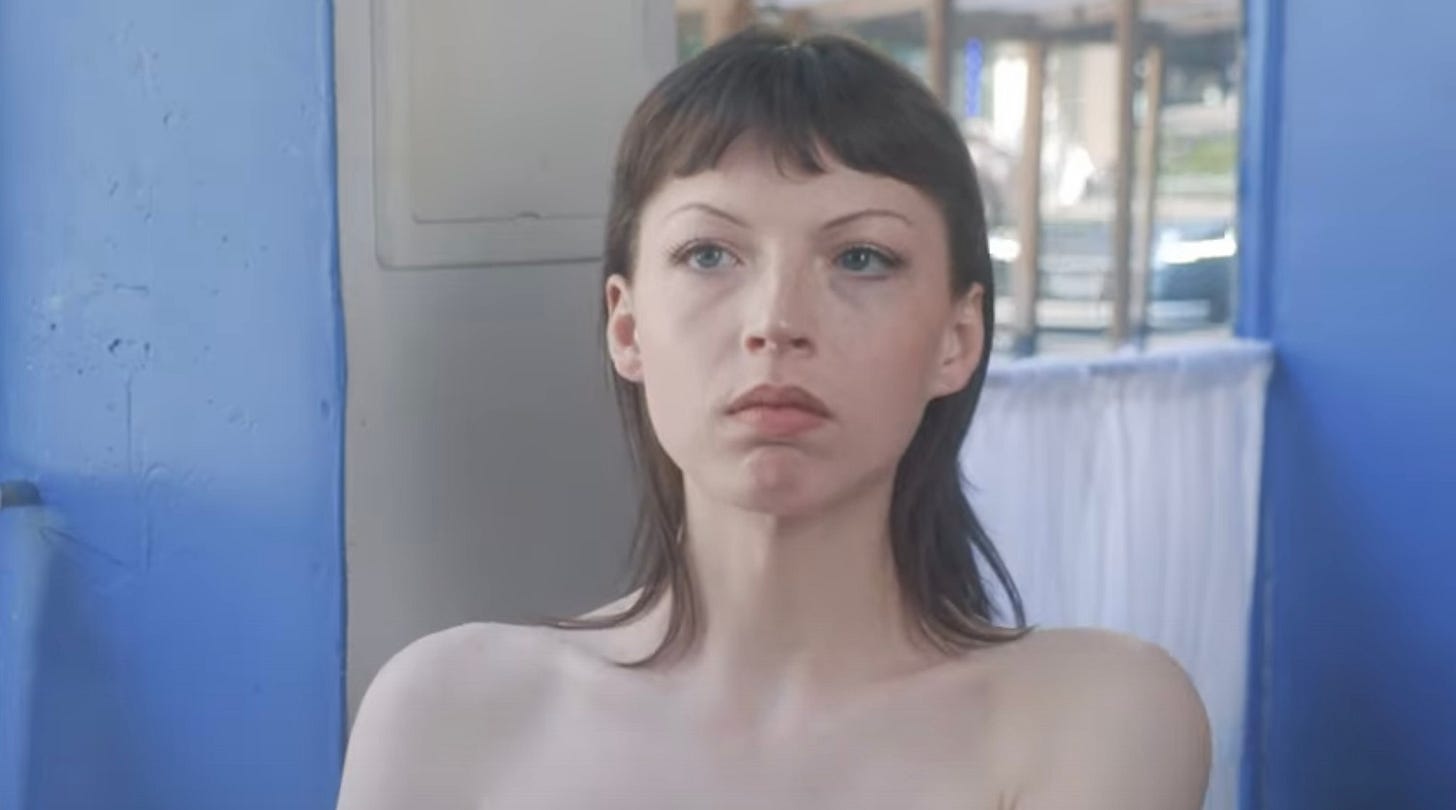Quick Thoughts: Envy/Desire
A Gender Critical-ish Take on a Short Film Full of Gender
In the late 1980s, Canadian sexologist Ray Blanchard Noticed™ something.

Studying the then-new topic of transsexualism, he noticed that two distinct sets of male-to-female transsexuals were showing up at gender clinics. Group A were biological males who were exclusively attracted to other men and were naturally very feminine. They transitioned at a young age, the absolute latest usually being in their late 20s (this is why you never, ever see older gay men who come out as trans). This was the group that even middle-American normies could comprehend- “I get it, it’s not just being gay, it’s being EXTRA SUPER GAY”. Blanchard dubbed this group Homosexual Transsexuals, or HSTS for short.
Group B, however, is when things started to get complicated. Group B consisted of biological males who were attracted to women. Group B transitioned much later in life than Group A, and were often married with wife and kids before they came out as trans. Unlike Group A, Group B also had stereotypically “masculine” interests (computer programming being a big one) and many came from a military background. Most controversially, this group reported being aroused by wearing women’s clothing or by imagining themselves as women. Blanchard dubbed this phenomenon “autogynephilia” (or “AGP” for short) which translates to “love of oneself as a woman”.
Decades later, in the year of our Lord and Savior 2024, a short indie film about autogynephilia titled Envy/Desire was released.
The film centers around Bella, a MTF socialite living her best Sex and The City life in NYC with her boyfriend Ethan. However, something about Ethan seems…. off. She discovers that he’s been watching Sissy Hypnosis (if you don’t know what that is, I recommend looking that up in a Private tab with SafeSearch on). Soon, he starts wearing her lingerie while dancing Buffalo Bill style to hyperpop music. Gradually, this devolves into Ethan living in full-time girlmode, stomping around in ill-fitting high heels and embarrassing Bella at her friend’s CUNTY DOLL BRUNCH. However, with the help of post-nut clarity, Ethan comes to his senses and goes back to presenting as a man by the end of the movie.
The director and main lead, Aimee Armstrong, has insisted on her Twitter that the film isn’t meant to be anything else but a lighthearted rom-com based on her experience dating men as a very online transwoman. This may be so, but it’s also easy to view it through a Gender Critical-adjacent lens. Although Bella is a HSTS, her experience in the film mirrors that of Trans Widows, women whose husbands have left them to pursue a gender-bendy lifestyle that’s often AGP in nature. Envy/Desire, or at least my personal interpretation of it, is anti-Queer Theory. During a moment of intimacy, Ethan tells Bella that he can’t take off his wigs or heels because then he isn’t being his “true self”, much to Bella’s dismay. This scene rejects the core component of Judith Butlerian Jihad, the idea that gender is a performance and your “authentic self” is something that can be purchased through clothing and accessories (fellow Substacker Freya India wrote a wonderful article about this topic recently). Unlike Ethan, Bella doesn’t expect the same validation from other people based on the flimsy concept of one’s “self-identity”. Is Bella a man, a woman, or a secret third thing? Should I be using “she“, “he” or “s/he” to refer to her in this post? Whatever she is, she doesn’t feel the need to “pass”, “present” or “identify” as anything, she simply is. It reminds me of wise words by artist and GC personality Nina Paley that sums up my view on the Gender Wars: “sex is real, let people be weird” (within reason).
Another part of the movie that I thought was amusing was a retvrn to playful gender dynamics. Before the internet opened up a floodgate of He-Man Woman Hating sideshows like Andrew Tate and the rest of the Manosphere, as well as violent and degrading pornography advertised as “sex positivity”, the battle of the sexes used to be, well, a lot more fun.
Both men and women had more of a mutual jokey “aw, shucks” approach to the quirks of the opposite sex, exemplified in media such as the Cathy comics or the recent Barbie movie.
To use an analogy I mentioned in a previous article, the relationships between the sexes should be viewed as, say, the ones between Americans and Canadians (or, if you prefer- Americans and Brits): we have our odd differences that we tease each other about, but at the end of the day we’re more alike than different. No one would tell someone that they’re not “really American” because they like Tim Horton Timbits1 or prefer hockey to baseball. Of course, there are areas where this analogy doesn’t work: unlike what side of the Northern border you were born on, there are undisputed biological differences between males and females. A Canuck can become a US citizen through paperwork and willpower, however, biological sex is immutable and can’t be changed. Still, I think it’s a healthier way to view the world than the mindset that men and women are some kind of drastically different alien species.
In the aforementioned Cunty Doll Brunch scene in Envy/Desire, Bella’s reaction to Ethan’s antics is that of bewilderment. Again, rather Bella is a woman and Ethan isn’t depends on your definition. However, to use dorky academic language, Bella is a “feminine-presenting person”, reacting to another person not serving femme realness with a shrug and a “can’t live with ‘em, can’t live without ‘em” attitude. If the film was a mainstream romantic comedy that came out in the 1980s, Bella would be a women-born woman reacting the same way to her boyfriend in butch qween dragz. Although I don’t exactly yearn for humor like this that made boomers laugh so hard they ruptured a lung to make a comeback, maybe some good-natured gender satire would be a chance for America to heal.
So overall, is Envy/Desire a masterpiece and a scathing, holds no-boundaries indictment of queer theory and gender ideology? No, not really. Is it a fun film that’s a cathartic watch if you, like me, are super invested in the online Gender Wars and need a chance to laugh at yourself? Yes. Is it giving? Sure.
Final thoughts:
The supporting actress, Salomé, has very pretty facial features.
“Mine” by Slayyyter is a bop, and I’m glad that Aimee got the licensing rights to use it in her film. However, I feel like this song by Indie artist and professional troll Ariel Pink would have fit the movie just as well:
Here in the US these are better known as “donut holes”.




I enjoyed Salome's acting in the film, and agree, the plot did get kinda trad/trans widowy in an odd way.
Aimee's character was great, and I think she had an interesting conundrum with the chasers and agp guy wanting the 'idea' of her and not her as a person... And the live video at the beginning followed by the bedroom scene where she asks her bf if he is attracted to her, it's interesting to parallel that with the bf's demands that she respect his pronouns. Like they both want to be perceived as women, desired as women but from different points of vunerability. Bf is just horny and envious of women's bodies, and aimees character yearns to be loved for who she is and thinks a 'straight' man loving her could do that for her.
Excellent article, thank you Lemon. I’m curious, as you read the research of this Dr you mention at the beginning, did you see what percentage of males were group A and what percentage group B? And what would you say is the main driver for what we see today- an almost complete and full reversal of the trend? (From “trans” being either very young males or somewhat older males, to “trans” being mostly teen/adolescent girls?